What Do We Consider Similar Cards?
There are several reasons why we might consider two cards to be similar. They could have similarities in art, name, or even flavor text.
However, the primary and only indicator we used in this article was the effect of each card. If two cards have nearly identical effects for a similar cost within MTG and HS, we decided to add them to the list.
Ten Similar Cards from MTG and Hearthstone
Innervate and Lotus Petal
This is almost a one-to-one comparison. Some players believe that a ritual would be a better choice than Lotus Petal because Innervate is not a permanent. However, considering that Innervate literally costs zero mana to use, something relatively rare in Hearthstone, and can only be used once (excluding recursion), the choice for us was clear.
A small curiosity: before being nerfed, Innervate used to generate 2 mana at no cost, allowing players to perform: Innervate, Innervate, and a five-mana card on the first turn. This led to comparisons at the time with the beloved Black Lotus, which to any Magic player would sound like a joke.
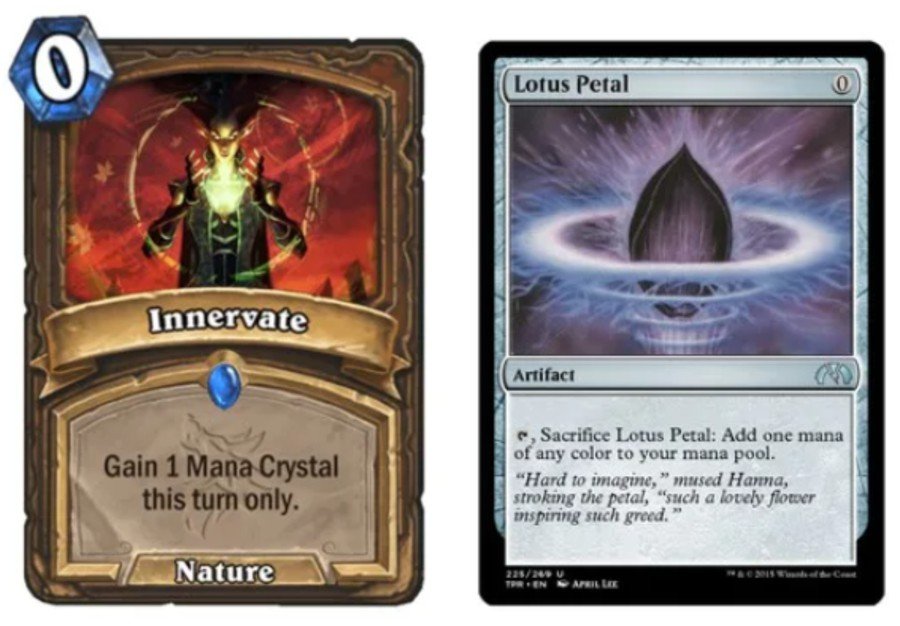
Regenerate and Healing Salve
Healing Salve is probably the worst of the cards in its cycle in Magic: The Gathering. Compared to other options that help secure victory in the game, such as reducing the opponent's life to zero or increasing your own resources to gain more advantages when facing the other player, Healing Salve just... delays your own defeat a bit.
Regenerate, the card similar to Healing Salve, is a case of power creep; however, even costing zero mana, the card never saw any play in Standard. The only time this card saw a small ray of hope was in a Wild deck that used Embrace the Shadow to deal damage.
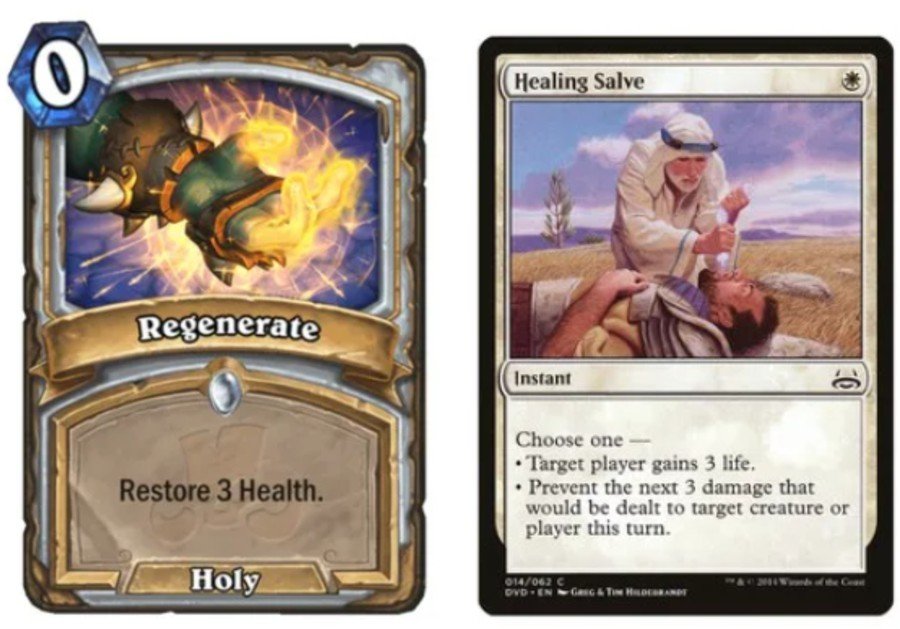
Lightning Bolt and… Lightning Bolt
There isn’t much to debate between these two cards: even their names are shared. Both are fundamental in almost every aggressive deck that can use them and have a constant presence in various metagames in their respective games.
It’s worth noting that in Hearthstone, Lightning Bolt causes overload 1, which prevents the use of a mana crystal, effectively increasing the card's cost by 1 mana. Additionally, in Hearthstone, the opponent starts with 30 life instead of 20. Despite these differences, the card is used whenever available, demonstrating the power of both. They are similar not only in effect, but also in winning games.
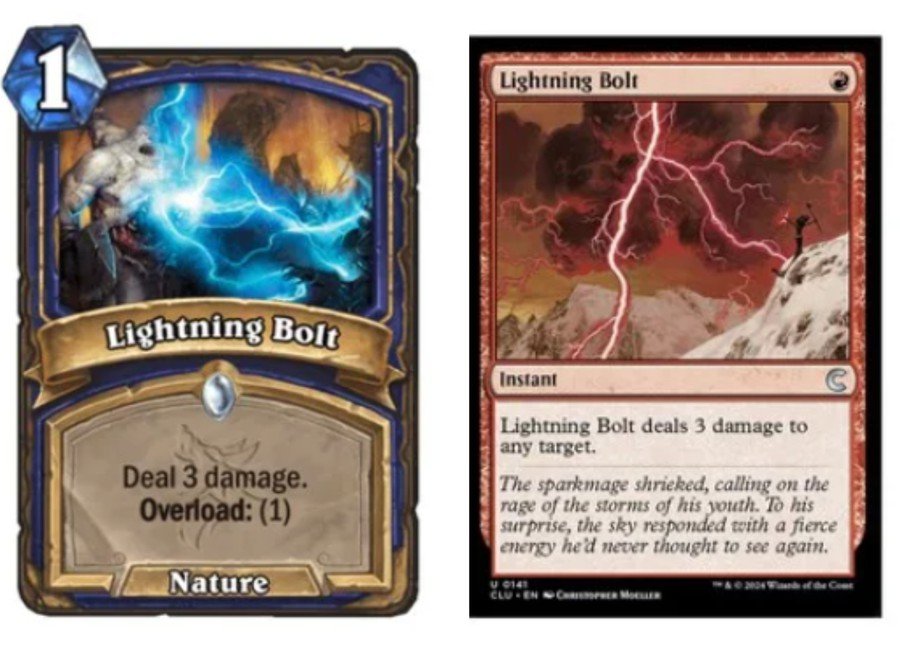
Archmage Emeritus and Gadgetzan Auctioneer
Both cards are extremely powerful draw engines, capable of ensuring victory on their own if left unanswered. The two major differences between them are the fact that Archmage Emeritus works with copied instants and sorceries, while the Auctioneer has a higher mana cost.
However, despite this, Archmage Emeritus sees no competitive play, while our polarizing Auctioneer, responsible for the famous Miracle Rogue and it's variants, needs only a good zero-cost card to make the deck dominant again.
Meanwhile, Archmage Emeritus is relegated to appearing only at Commander tables in MTG.
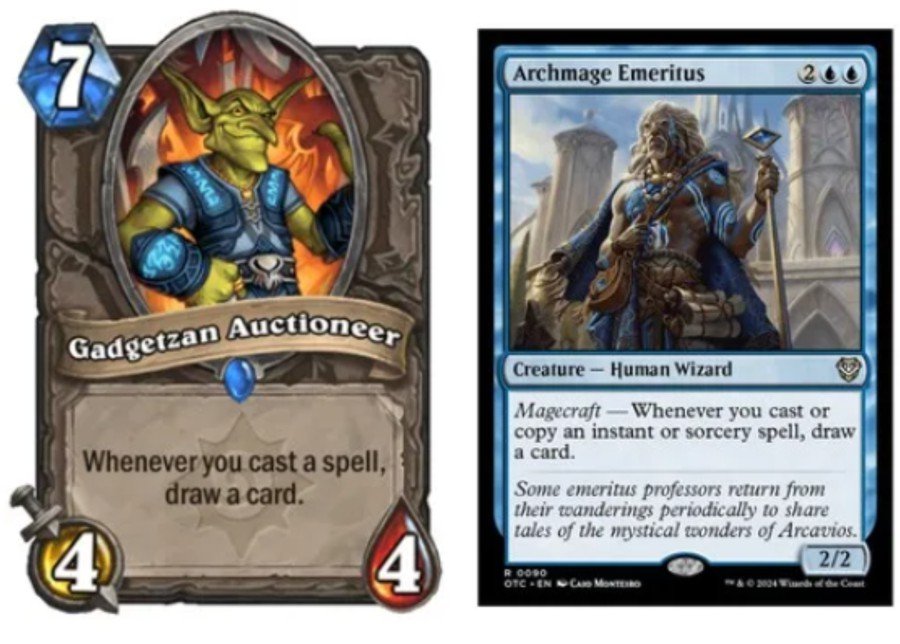
Razorscale and Trinisphere
Legacy players, please close your eyes; the following images may cause strong reactions.
Razorscale is a sort of mini Trinisphere for Hearthstone, which trades part of the ability to delay the game for a 2/4 body capable of pressuring the opponent’s life total. Despite this clear advantage, Razorscale never found space in the Standard format, while Trinisphere continues to have a frightening presence in the formats where it is legal.
Part of this is due to the difference in power level of each game. In Hearthstone, it’s rare to want to play several cards costing less than two (unless playing with the Auctioneer) in a single turn, and when Razorscale comes into play, usually on turn 3, its best targets have already been used.
On the other hand, Trinisphere thrives in a format full of free spells and, to make matters worse, can be cast as early as the first turn, taking the opponent out of the game for at least three turns.
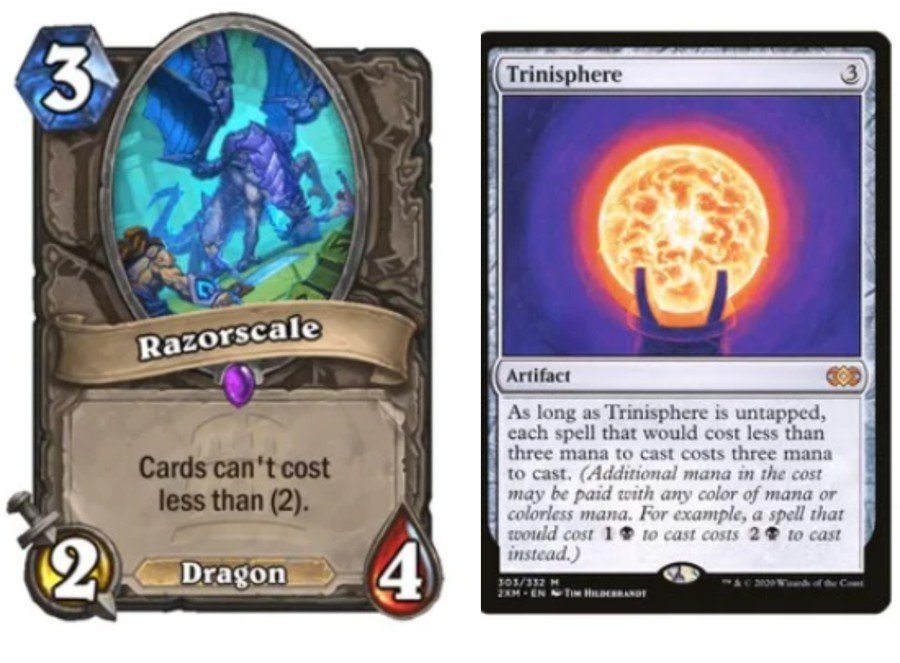
Time Warp and Temporal Manipulation
Time Warp and Temporal Manipulation have exactly the same effect for the exact same mana cost. Nothing more needs to be said to explain why we consider these two cards similar, right?
But this comparison isn’t exactly fair. Our Magic card, Temporal Manipulation, is a card that on its own already makes its effect powerful. Blizzard's counterpart, Time Warp, is part of a quest line, a mechanic created in Hearthstone that forces you to complete several challenges before being able to use the card. Even with all this difficulty, Time Warp was part of one of the most oppressive decks in Hearthstone’s history.
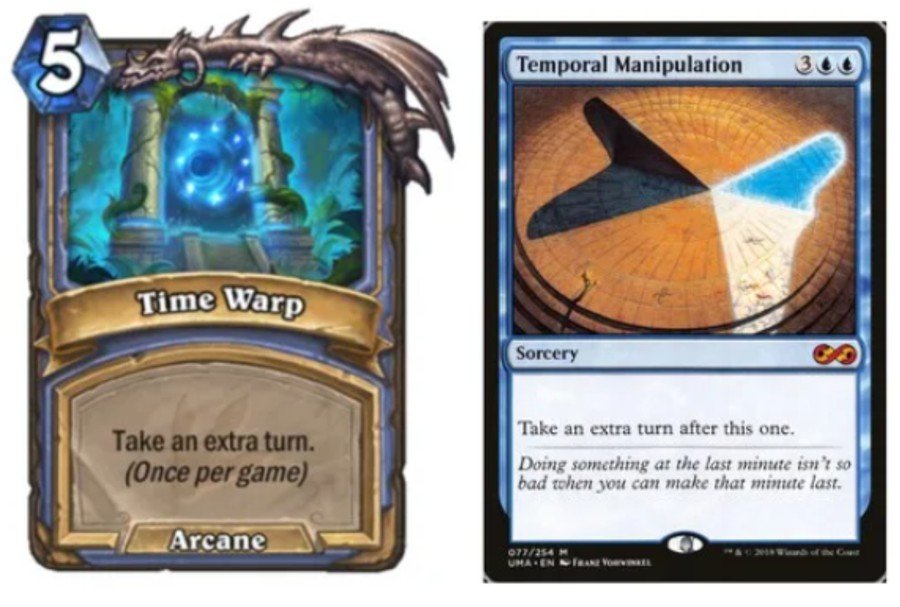
Far Watch Post and Sphere of Resistance
Look, we won’t lie: Sphere of Resistance is clearly a stronger card, as it affects cards already in your opponent’s hand, something very valuable in a game like Magic. But that doesn’t mean Far Watch Post doesn’t have its advantages.
The Hearthstone card’s biggest pro is that it is asymmetrical, which means it only affects your opponent and allows it to be played in a greater variety of decks. Additionally, the effect of increasing the cost of cards persists even after the Watch Post is removed, as it modifies the card itself at the moment it is drawn. However, this doesn’t diminish its biggest weakness: the fact that it is a creature and, therefore, susceptible to removal in the game.
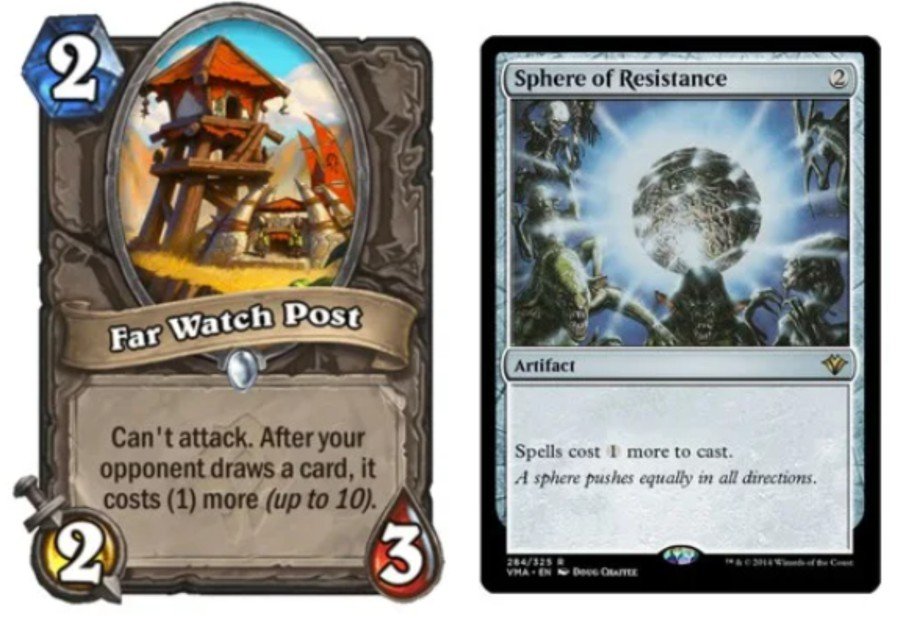
Stonemaul Anchorman and Ripjaw Raptor
Both are cards that have the effect of drawing more cards when they take damage, with the most significant difference being that Frenzy happens only once, while Enrage can occur multiple times.
Additionally, Stonemaul Anchorman has Rush, a Hearthstone keyword that allows the minion to attack immediately, without suffering from summoning sickness. It’s worth noting that Stonemaul Anchorman also costs one more mana, delaying its entrance to the battlefield. However, this additional cost doesn’t become such a big problem because it can trigger on its own.
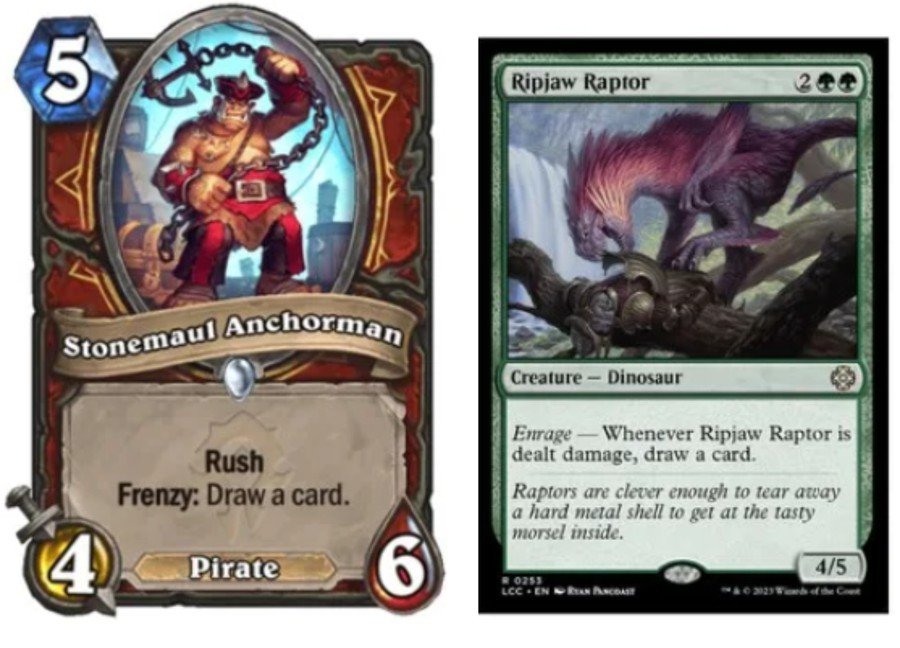
Vesuvan Doppelganger and Faceless Manipulator
These two cards (and many other copy effect cards in Magic) are so similar they could be twins. Both have the effect of copying a creature when they enter the battlefield. Despite there being simpler variants of the same effect in Magic that could fit better with Faceless Manipulator, we chose Vesuvan Doppelganger as it aligns even in mana cost with the Hearthstone card.
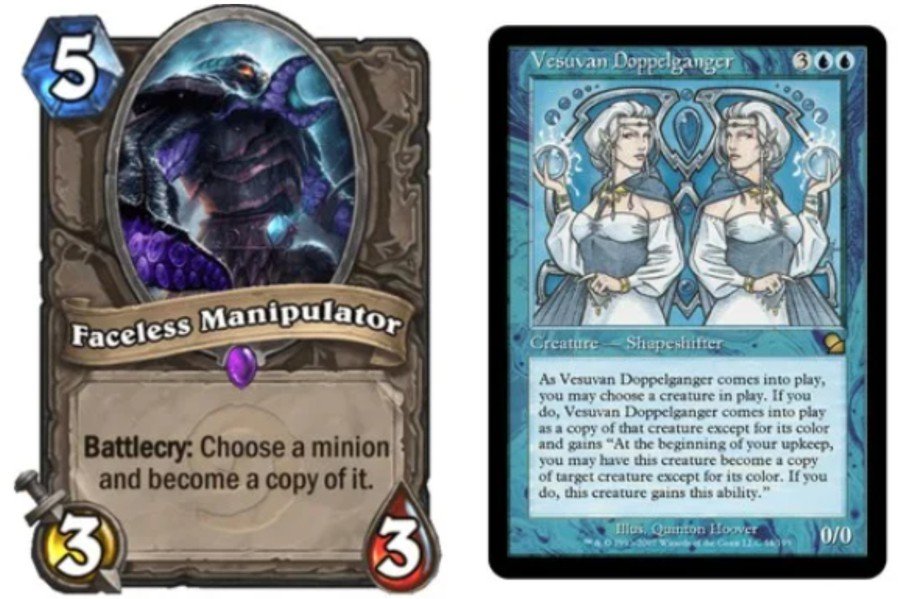
Genn/Baku and Companions
These are more mechanic similarities than the cards themselves, as their effects aren’t that similar. Genn Greymane and Baku The Mooneater are cards that grant a bonus effect to your deck as long as you follow the deck-building rules they require, in this case, Genn only having even-numbered cards in the deck and Baku only having odd-numbered cards.
Just like the companions, which require the deck to meet the correct parameters. In the case of Genn and Baku, the effects are less restrictive than companions like Lurrus, which forces the player not to use cards with CMC (converted mana cost) greater than two. But don’t be fooled; the effect of the Hearthstone cards is just as dangerous.
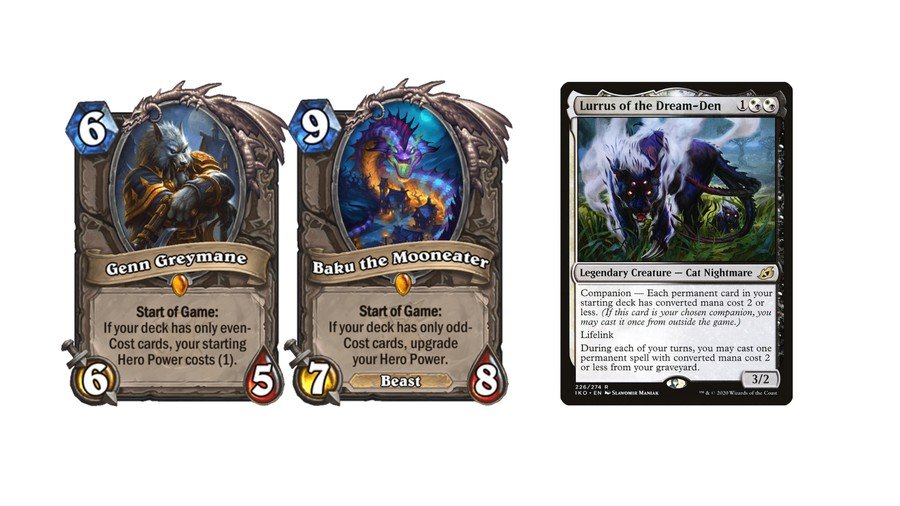
Conclusion
When analyzing the cards side by side, it’s evident that some resemble their counterparts much more than others, but this choice was made deliberately to present the greatest possible variety of cards with different effects. Do you agree with them? Did we go too far with some of them? We had several other cards that didn’t make the list, so a second part might be in the plans. Tell us in the comments what you think and which cards you would add to the list!
For more information about the Hearthstone universe, keep following our articles.








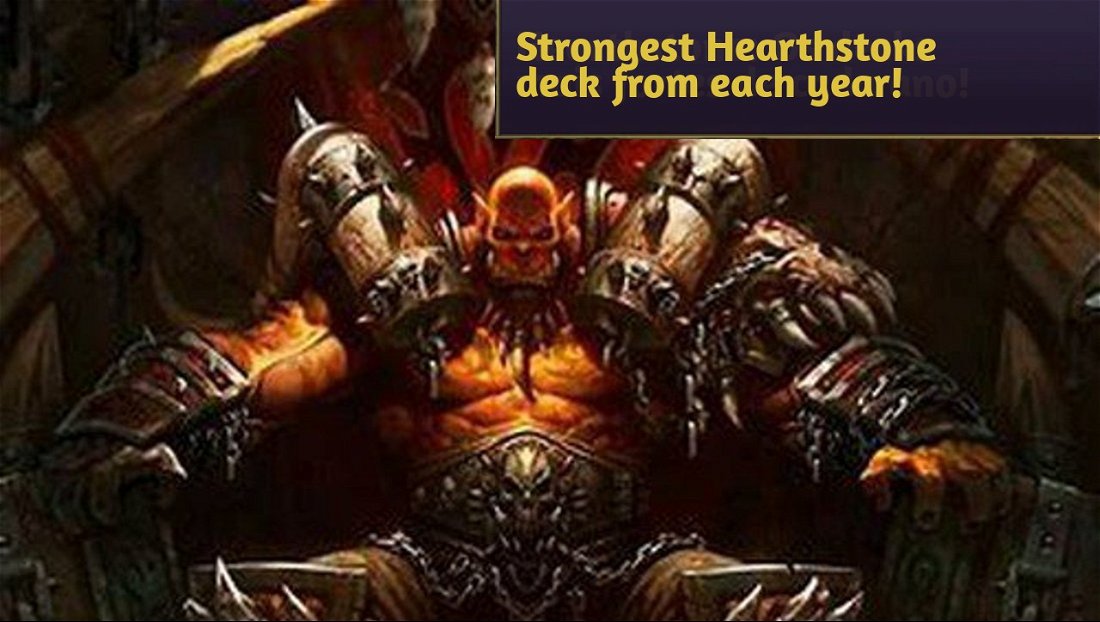
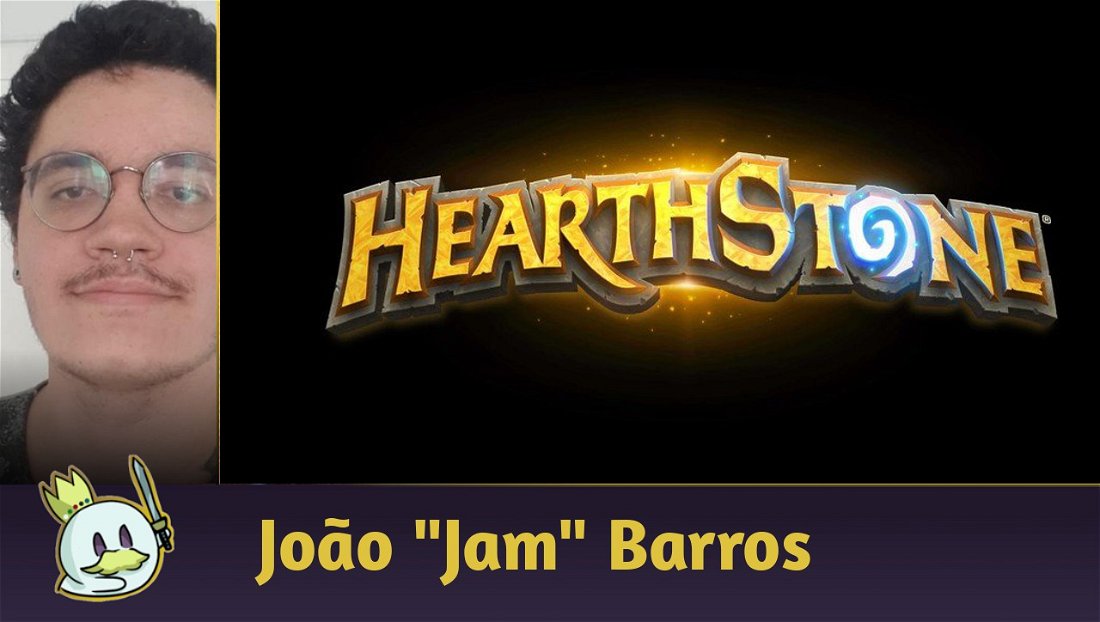



— Comentários 0
, Reações 1
Seja o primeiro a comentar